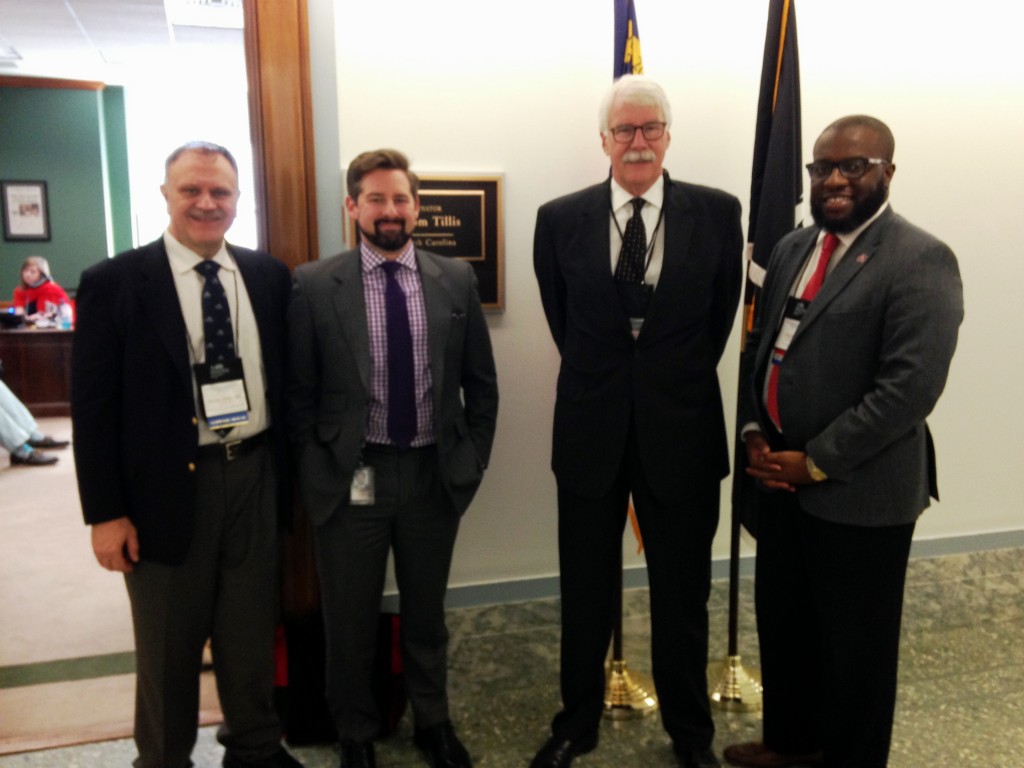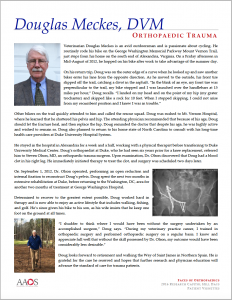
From left to right: Dr. Steven Olson, Matt Flynn (Health Care Liaison to Senator Tom Tillis from NC), Dr. Douglas Meckes, and Mr. Craig King (from SC)
On Thursday, April 14, 2016, Steven A. Olson, MD, FACS, and his patient, Douglas Meckes, DVM, travelled to Washington, D.C., to participate in the AAOS Capitol Hill Research Days and to lobby Congress on the critical need for research funding. Below is a press release from the AAOS, as well as why patients like Douglas Meckes, DVM, hope that further research and physician education will advance the standard of care for trauma patients.
For more information, contact:
Elizabeth Fassbender / fassbender@aaos.org / 202.548.4143
For Immediate Release
April 22, 2016
Orthopaedic Surgeons, Patients, and Researchers Personalize the Critical Need for Research Funding
Over 100 Million Americans a Year Identify Bone and Joint Disorders as Their Number One Health Concern
Washington, D.C. — Orthopaedic surgeons, patients, and researchers visited Capitol Hill on Thursday, April 14 to raise awareness about the debilitating and costly musculoskeletal diseases and disorders afflicting millions of Americans and emphasize the need for research funding. Advocacy teams urged Congress to appropriate $34.5 billion in FY 2017 to the National Institutes of Health (NIH) and to support the Next Generation Researchers Act.
Nearly one in every three Americans has a musculoskeletal condition requiring medical attention. The American Academy of Orthopaedic Surgeons (AAOS) Research Capitol Hill Days event puts a face to these statistics by focusing on patient stories, encouraging members of Congress to keep musculoskeletal research a high priority on the U.S. political and fiscal agenda. Orthopaedic patients, representing a diverse range of ages and conditions, offered legislators a personal viewpoint about how research advancements and new treatments and surgical techniques have benefited their health and overall quality of life.
“Millions of Americans suffer from disabling musculoskeletal disorders, but because of innovative treatments developed through medical research, patients like me have been able to return to their everyday activities,” said Pamela Schroeder, an orthopaedic patient and Research Capitol Hill Days participant. “Research Capitol Hill Days allows me to tell my story and get the word out about the importance of research funding to continue to improve the technology available to restore mobility to patients with musculoskeletal disorders.”
The President’s Fiscal Year 2017 NIH budget requests $33.126 billion in funding for NIH. This proposed $825 million budget increase for NIH would represent a small increase over the current funding level. Instead, the orthopaedic community urged Congress to appropriate at least $34.5 billion through the Labor-HHS-Education Spending bill for FY 2017. This number, $34.5 billion, has been agreed upon by the Ad Hoc Group for Medical Research, and represents five percent real growth above the projected rate of biomedical inflation, and will help ensure that NIH-funded research can continue to improve our nation’s health.
NIH-supported research has led to remarkable breakthroughs that improve health, save lives, and create jobs. However, current policies are putting the brakes on research and innovation. Since 2003, the National Institutes of Health (NIH) budget has failed to keep up with inflation, decreasing the purchasing power of the NIH by over twenty two percent, while our global competitors accelerate their research capabilities. Over the past four decades, the average age of a young researcher receiving his or her first NIH grant has increased from 38 to 45. During the same time period, the percentage of research grants with a principal investigator under age 36 has declined from 18 percent to 3 percent. This trend is devastating to our nation’s young researchers and has contributed to a stagnation in our research workforce.
The AAOS recognizes that scientific and medical innovation depends on our ability to foster, support, and invest in the next generation of clinician investigators and basic scientists. The AAOS supports the efforts of the Next Generation Researchers Act to build opportunities for new researchers, and invest in the future of research, science, and innovation.
“The funding that is currently available for research into new and better treatments, preventative measures, and diagnostic testing does not match the burden of disease,” says AAOS President Gerald R. Williams, Jr., MD. “These innovations will require an investment in both basic science and clinical research performed at the NIH.”
Musculoskeletal diseases are the most common health condition in the United States and the second leading cause of disability worldwide. 1 in 2 (126.6 million) adults are affected, twice the rate of chronic heart and lung conditions. Musculoskeletal diseases and disorders cost the U.S. economy $874 billion annually and represent 5.7% percent of the country’s gross domestic product. Despite the costly nature of musculoskeletal conditions, funding for orthopaedic research has grown slowly. Musculoskeletal research represents less than 2% of the NIH budget, while burden of musculoskeletal conditions expected to escalate in the next 10-20 years due to the aging population.
Source: www.boneandjointburden.org
For more information, please visit www.aaos.org/researchdays.
Join the conversation about your orthopaedic health: Like AAOS on Facebook (www.facebook.com/AAOS1), and follow @AAOS1 and @AAOSAdvocacy on Twitter
The AAOS Research Capitol Hill Days event can be tracked on social media with the hashtags #RCHD2016 and #OrthoResearch

